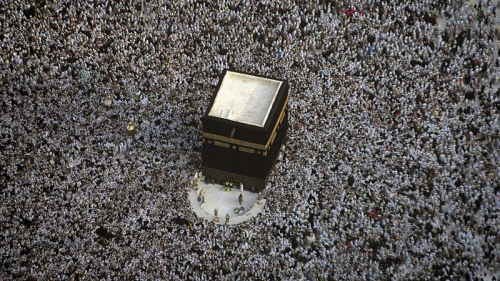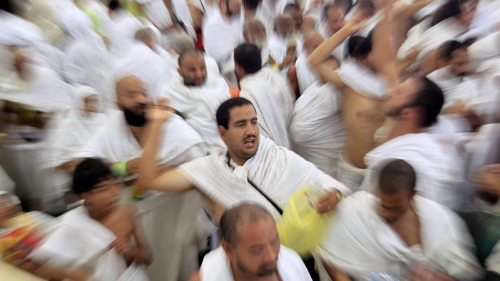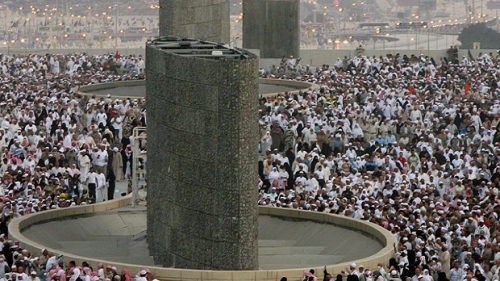Ghaib (غَيْبِ), Sabr (صبر) and Maghfirah (مغفره)

In the very beginning the Qur’an has said about Believers:
يُؤْمِنُونَ بِالْغَيْبِ
Who believe in the unseen (2:3) [Yusuf Ali].
Some people believe that anything can happen in the future, even mustard can grow on one’s palm! Or, it is as if someone will move a stick in a certain way and fire will come out. In contrast to this, there is this laborious process a farmer goes through. He works very hard in preparing the ground for planting; selects appropriate and healthy seeds and plants them in the field; waters them; removes the weeds; comes daily to monitor the security of his farm and goes home empty handed every day. He follows the same routine not one day, not one week, not one month, but relentlessly for several months. And the result of his hard work does not come to him. Why does he then do this, every day? What is it that drives him to return everyday empty handed and yet compels him to go in the morning the next day? What is it that encourages him to go through this routine every day? This is nothing but the faith and 100% conviction that from those seeds buried in the ground will result in a crop that will yield a bumper harvest.
This is what is meant by the faith in the unseen – بِالْغَيْبِ (Bil-Ghaib) – that even though the result does not appear immediately but, nevertheless, having 100% conviction that it will come out at the appropriate time. On what basis is this unseen faith founded? It is founded in the belief that the seed does not have freedom of choice; that it is not up to it to germinate or not to germinate. It follows certain laws. It is not up to its own whims whether to grow or not. It is bound by a law. If the soil is right, the seeds are good, fertilizer is there, watering is done at appropriate times, and the farm is monitored and protected, then the crop will grow – these are all required laws of farming. The seed is subject to these laws. It is not up to the seed to violate these laws. This one grain of seed produces hundreds of grains in the words of the Qur’an (2:261).
This, then, is the belief in the unseen results of one’s action and is called the faith in the unseen – بِالْغَيْبِ (Bil-Ghaib) by the Quran?
مَّثَلُ الَّذِينَ يُنفِقُونَ أَمْوَالَهُمْ فِي سَبِيلِ اللَّهِ كَمَثَلِ حَبَّةٍ أَنبَتَتْ سَبْعَ سَنَابِلَ فِي كُلِّ سُنبُلَةٍ مِّائَةُ حَبَّةٍ ۗ وَاللَّهُ يُضَاعِفُ لِمَن يَشَاءُ ۗ وَاللَّهُ وَاسِعٌ عَلِيمٌ
The parable of those who spend their substance in the way of Allah is that of a grain of corn: it groweth seven ears, and each ear Hath a hundred grains. Allah giveth manifold increase to whom He pleaseth: And Allah careth for all and He knoweth all things. (2:261) [Yusuf Ali]
Qur’anic meaning of صبر (Sabr)
This belief in the unseen is for every effort. Obviously, the result of any effort does not appear right away. It takes time. One has to toil and struggle persistently. The result does appear only after some time. This happens according to Allah’s Law of Requital.
وَمَا تُجْزَوْنَ إِلَّا مَا كُنتُمْ تَعْمَلُونَ
And you will be requited nothing except for what you used to do (37:39) [Hilali & Khan]
اصْلَوْهَا فَاصْبِرُوا أَوْ لَا تَصْبِرُوا سَوَاءٌ عَلَيْكُمْ ۖ إِنَّمَا تُجْزَوْنَ مَا كُنتُمْ تَعْمَلُونَ
Taste you therein its heat, and whether you are patient of it or impatient of it, it is all the same. You are only being requited for what you used to do. (52:16) [Hilali & Khan]
Those nations who have faith in the efficacy of this Law of Requital continue to work hard and continue to believe that the results will appear in due course. They do not get tired. They neither get frustrated nor get disappointed nor resign in the middle of their effort. This is what the Qur’an has called صبر (Sabr) or patience. صبر (Sabr) does not mean what is prevalent amongst us – that when nothing works; when frustration sets in; when people get disappointed, and when they think that nothing is happening – they say: So, dear brothers and sisters! Do صبر (Sabr). What can be done?! Whatever was written in the kismet (destiny) will happen anyway! Nothing can be done now!! This is what صبر (Sabr) has become now in our culture.
But in the Qur’an صبر (Sabr) is something that a farmer goes through day in and day out for months at a time with perseverance and steadfastness. This whole process is what is defined as صبر (Sabr) according to the Qur’an and the one who perseveres through this process is calledصابر (Saabir).
Qur’an said that this faith in the unseen – بِالْغَيْبِ (Bil-Ghaib) requires صبر (Sabr). We must have full faith and conviction in this whole process of صبر (Sabr).
The Qur’an says:
إِنَّهُ لاَ يُفْلِحُ الظَّالِمُونَ
But verily the wrong-doers never shall prosper (6:21) [Yusuf Ali].
This means oppressors and tyrants won’t flourish; that they will eventually fail. This is the Law of Requital that the Qur’an proclaims. And this law is unchangeable.
وَلَقَدْ كُذِّبَتْ رُسُلٌ مِّن قَبْلِكَ فَصَبَرُوا عَلَىٰ مَا كُذِّبُوا وَأُوذُوا حَتَّىٰ أَتَاهُمْ نَصْرُنَا ۚ وَلَا مُبَدِّلَ لِكَلِمَاتِ اللَّهِ ۚ وَلَقَدْ جَاءَكَ مِن نَّبَإِ الْمُرْسَلِينَ
Rejected were the messengers before thee: with patience and constancy they bore their rejection and their wrongs, until Our aid did reach them: there is none that can alter the words (and decrees) of Allah. Already hast thou received some account of those messengers. (6:34) [Yusuf Ali]
Tyrants and oppressors must remember that this law is bound to produce its consequence, no matter what. But how will it happen? It will happen according to this Qur’anic law of requital that what you sow is what you reap; that tyrants will fail; and that if others join hands with tyrants then the speed of failure will increase. And it must be borne in mind with 100% surety that oppression is bound to fail ultimately.
In any case, this is what a farmer’s belief in the unseen results of his actions keeps him going; and he knows that each seed when nourished properly and taken care of is going to produce a hundred grains (2:261).
Actions do not produce quick result
Whatever laws the Qur’an has given regarding humans they have this characteristic that they do not produce results quickly. Now, the complaints we keep hearing daily are: We are told that Allah is just; that He does justice; that He won’t let tyrants succeed. But we observe daily that tyrants flourish; that dishonest keep on piling wealth after wealth; that no business succeeds if done honestly. Then what is this?! Why the laws of Allah are not working? Actually, they are working but we do not have faith in them.
We are not like the farmer who works hard and perseveres months after months, follows the laws of farming; then only he gets the fruits of his labor. We, on the other hand, sit at home and say: Since Allah’s law is that from one seed will grow hundred seeds then the day when hundred seeds grow we will go and get them. This is not (2:3) يُؤْمِنُونَ بِالْغَيْبِ – the faith in the unseen.
According to the Qur’an the faith in the unseen means: that every worker; every laborer; every technician who has the conviction that whatever I am doing; the machine I am making; the instrument I am designing; -- maybe it may take one month or six months or a year, but one day it will work; that one day the result of the effort will bear fruit for which the worker is persevering day and night even while suffering hardships and hunger.
This is the steadfast belief in the mission objective followed by continuous action and 100% conviction in the unchangeable law of requital of the Qur’an that the result is bound to come out for sure at the proper time.
We have belied this belief. The truth is that people do not have faith in the law of requital. People say: Allah’s law of requital does not work; that we see that dishonest succeed; that dishonest businessmen flourish. This is belying the law of Allah. When this situation develops then how would people be motivated to work honestly! They must have the full faith and conviction in unseen results – this is (2:3) يُؤْمِنُونَ بِالْغَيْبِ .
Fear and trepidation
The Qur’an says that a nation raised on the basis of its laws as well as its followers will have no fear nor suffer from any anxiety (2:38, 2:62, 2:112, 2:262, 2:274, 2:277, 3:170, 5:69, 6:48, 7:35, 10:62, 46:13).
إِنَّ ٱلَّذِينَ قَالُوا۟ رَبُّنَا ٱللَّهُ ثُمَّ ٱسْتَقَـٰمُوا۟ فَلَا خَوْفٌ عَلَيْهِمْ وَلَا هُمْ يَحْزَنُونَ
Verily those who say, "Our Lord is Allah," and remain firm (on that Path),- on them shall be no fear, nor shall they grieve. (46:13) [Yusuf Ali]
We, on the other hand, right from childhood, sow fear of Allah in the hearts of children. To children then Allah becomes a symbol of fear and trepidation. Fear! Fear! And more fear!! In fact, humanity gets crushed with fear.
Let us take: يَخْشَوْنَ, خَشِيَ – there is nothing in this to fear Allah. Whenever, the Qur’an uses for example: (23:57) هُم مِّنْ خَشْيَةِ رَبِّهِم” – then it means: being careful from the adverse consequences of violating the law of requital, being afraid of the consequences that are bound to occur if one does not follow the message of Allah; that when one violates His laws then one will suffer their destructive consequences. This is what is meant by fear. This is a fear of the unseen destructive results of bad actions which do not appear right away.
Period of respite is Allah’s mercy
The Qur’an mentions that those who opposed the Prophet (PBUH) used to taunt him: Why don’t you bring the destruction that you keep on warning us about all the time?! On this, Allah told that they do not recognize His mercy; i.e., they do not realize that He does not punish people right away after committing wrong; that there is a period of respite between the wrong action and its consequence. This respite has been bestowed by Him so that people might realize their mistake and correct themselves and thus be saved from destruction. The Qur’an says that if you correct yourselves then it is good for you only. Why should I punish people, says Allah? – We do not derive pleasure by punishing people for their wrong actions.
The period of respite is also an essential part of the law of requital and, indeed, is a mercy from Allah. Because, if we eat unhealthy food and if we get a disease (e.g. cancer) right away then no one will be saved. In this period of respite, small symptoms appear as warning signs. If we pay careful attention to these symptoms and are able to see a connection between continuing unhealthy food habits and the symptoms then, due to this period of respite embedded in the process there is hope; there is possibility for treatment and cure. If, on the other hand, there is immediate punishment for wrong action then no human being in the world will be saved.
Meaning of مغفره (Maghfirah)
Who is there who does not err, who doesn’t indulge? But Allah has kept the door open for treatment and reform. Allah has given power of intellect and thought. He has given freedom of choice too. This is why they fear the unseen consequences of bad actions – بِالْغَيْبِ “bil-gahaib”. For them is protection i.e., (67:12) لَهُم مَّغْفِرَةٌ وَأَجْرٌ كَبِير”.
This matter has great significance. But we normally translate “مَّغْفِرَةٌ” (Maghfirah) as baksheesh or forgiveness. And baksheesh in the name of Allah becomes common theme. Now, even the heaven comes as a result of baksheesh. This is not “مَّغْفِرَةٌ” (Maghfirah); this is not the meaning of this Arabic word. “مَّغْفِرَةٌ” (Maghfirah) means protection according to its Arabic root meaning.
The Qur’an says that those who fear the consequences of bad actions they get protection. The bad results do not appear right away. There is period for reform and correction. This is what we call preventive measures. In medical terminology these are those things that provide protection so that no harm occurs. This is called “مَّغْفِرَةٌ” (Maghfirah).
These preventive measures are great things or (67:12) وَأَجْرٌ كَبِيرٌ in the words of the Qur’an. If humans did these things, then the results that would follow will be of great significance indeed.
But the question is: how these great significant things will happen? The Qur’an says:
وَأَسِرُّوا قَوْلَكُمْ أَوِ اجْهَرُوا بِهِ إِنَّهُ عَلِيمٌ بِذَاتِ الصُّدُورِ
And whether ye hide your word or publish it, He certainly has (full) knowledge, of the secrets of (all) hearts (67:13). [Yusuf Ali]
That is, we cannot achieve these things by saying that we respect these laws but in our heart we hatch plans against them. We cannot deceive Allah like this. Whether we show your intentions or hide them, to Allah they are the same.
The Qur’an talks about freewill and freedom of choice and responsibility. It does not say that the results that appear outwardly, only they will affect us. The Quran even goes so far as to say that every intention in our heart and every thought going through our mind produce result as well. In fact, if one pays careful attention, one can see that it is the bad intention that is the seed of every crime – the external result is the final outcome but its start happens at the time the intention takes root in the heart.
First the intention, then the action, and then the result
The process starts from intention. Human beings first intend to do something and then they embark on practical steps. The Qur’an’s law of requital works on the intention as well. Now, if someone is caught having bad intentions, and he is stopped right there and then, the crime won’t take place. Then the question really becomes: how to have control over intention? This control occurs with proper education and training. With proper education and training, a conviction takes root in the heart: that a thing is wrong or criminal; that I should not do it; that I will be held accountable for it; that I will get punished for it. If these things become the voice of the inner conscience of human beings, then crime will stop. This is the reason the Qur’an provided these teachings.
External controls do not produce the desired results
The duty of the Prophet was also to teach the Qur’an’s message and its wisdom to the people (62:2):
“وَيُعَلِّمُهُمُ الْكِتَابَ وَالْحِكْمَةَ”
and to instruct them in Scripture and Wisdom. [Asad]
The Prophet (PBUH) explained why these laws are necessary. He had raised a nation based on these teachings. This is always the first step in reforming a society. According to the Qur’an these teachings should become the inner voice of the heart. What is wrong and what is right should come from the heart. External controls won’t work. No matter how much external controls are applied, no meaningful long-lasting reform will happen.
The Qur’an said that we must understand that actions as well as intentions of the heart both produce results. Human beings must understand that Allah is aware of the thoughts inside their hearts (67:13); that is, they cannot hide anything from Him.
وَأَسِرُّوا قَوْلَكُمْ أَوِ اجْهَرُوا بِهِ ۖ إِنَّهُ عَلِيمٌ بِذَاتِ الصُّدُورِ
And whether ye hide your word or publish it, He certainly has (full) knowledge, of the secrets of (all) hearts. (67:13) [Yusuf Ali]
Scope and characteristics of societal justice
The Qur’an says that Allah is a judge who is aware of even what is going on in our hearts. As for societal justice, it is there for society. In this kind of justice, when a crime happens and when there are witnesses for it, then only it is called a crime. But this system cannot have grip over the intentions of the heart. This system has an eye on the thoughts that are still in the form of intentions in the heart.
The social reform in Allah’s system starts from intentions, from desires, from wishes taking place inside the heart. Once they change then the outside world changes (13:11). This is the reason Allah says that He is aware of the passing thoughts in the hearts of human beings.
How could He, who created human beings, not know what is going on inside their hearts? What evidence is this?! If someone designs and makes a machine, won’t he know what is going on within it; that if something is wrong within it then won’t he be able to know why? Wouldn’t a clock designer be able to know why a clock is not working properly? What evidence the Holy Qur’an provides! – The Creator who created human beings won’t He be able to know what is going on in the heart?
The Qur’an has said that criminals will be recognized from their foreheads (55:41). A مومن (Believer) acquires this visionary power from the Qur’an. There is this beautiful hadith of the Prophet (PBUH): “Be afraid of the power of a مومن (Believer’s) vision because he sees through the light of Allah”. And the light of Allah is none other than the Qur’an. Through the Qur’an a مومن (Believer) acquires this power.
Now within the human limitation a person could acquire this power. But Allah’s attributes are absolute, complete, and infinite. Human beings cannot acquire His attributes to that extent. But a مومن (Believer) acquires the color of Allah by imbibing Allah’s attributes in his character within human limitation.
Believers (مُؤْمِنِينَ) say:
صِبْغَةَ اللَّهِ ۖ وَمَنْ أَحْسَنُ مِنَ اللَّهِ صِبْغَةً
Our life takes its hue from God! And who could give a better hue [to life] than God. (2:138) [Asad]
To the extent these attributes a person keeps imbibing in his character, he will continue to become مومن (Believer) to the same extent. And in a society; in a system; and in a state; if these attributes of Allah take hold and reflect the color of Allah – then only that society; then only that system; and then only that state will be called Islamic. Then only that state will be called the Qur’anic state as the Prophet (PBUH) established in Medina.
May Allah give us the fortitude, perseverance, and unwavering commitment to follow the shining footsteps of the Prophet (PBUH). Then Allah guarantees that His cosmic forces will join us in our effort to achieve this goal:
إِنَّ اللَّهَ وَمَلَائِكَتَهُ يُصَلُّونَ عَلَى النَّبِيِّ يَا أَيُّهَا الَّذِينَ آمَنُوا صَلُّوا عَلَيْهِ وَسَلِّمُوا تَسْلِيمًا
Verily, God and His angels bless the Prophet: [hence,] O you who have attained to faith, bless him and give yourselves up [to his guidance] in utter self-surrender! (33:56) [Asad]
Topics: Divine Law, Iman (Faith And Belief), Reasoning, Social Justice Values: Charity, Forgiveness, Freedom, Hope, Justice, Knowledge, Patience
Views: 4727
Related Suggestions

















